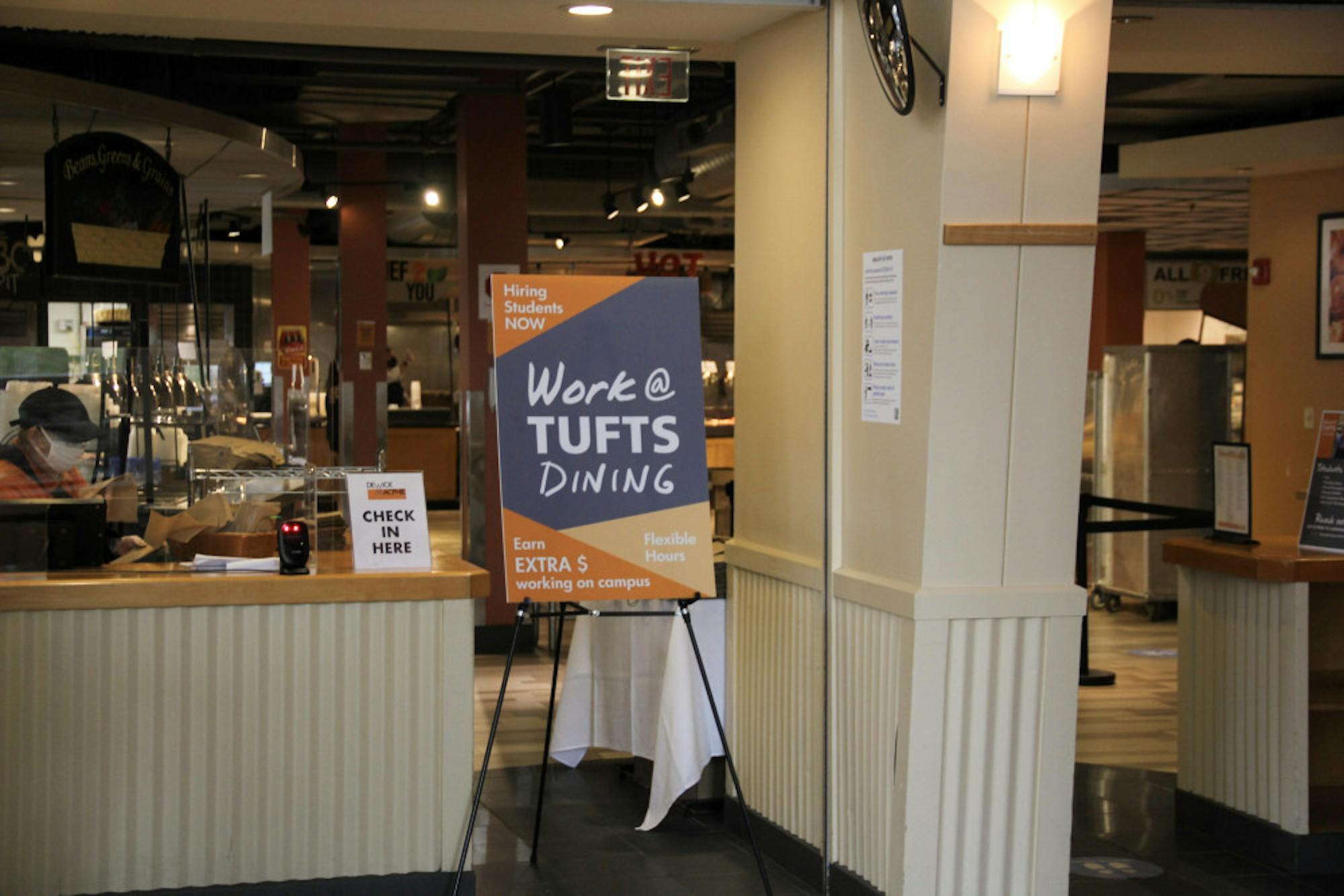Tufts Dining workers say that COVID-19 protocols and the new ordering system are causing a serious staff shortage, leaving them feeling weary and unappreciated.
University officials admit that adapting to the new system has been difficult but pledge that they are working quickly to fill staffing gaps.
Zahra Warsame, a second cook at Carmichael Dining Center, frequently tracks her daily steps on her phone. Normally, she walks about 9,000 or 10,000 steps a day, but recently she has been reaching 14,000 or 15,000 steps.
Warsame, who is also a union shop steward for UNITE HERE Local 26, which represents most dining workers, attributes this change to the new ordering system.
Before the COVID-19 pandemic, students would cycle through the buffet at their own pace, helping themselves to hot entrées and sides. Now, along with preparing the food, dining workers are serving, packaging and, in some cases, delivering meals to students.
“They have not added staff to support the operational need. They just stretch the staff that were there,” Warsame said. “Now you have to do two jobs instead of one.”
The pandemic has forced Tufts Dining to rework significant parts of their operations to make them contactless and socially distanced, according to Patti Klos, director of dining and business services.
“It’s difficult – for both employees and managers alike – to return to the workplace after being away for 5 months and have to deal with so many changes,” she wrote in an email to the Daily. “I believe that many staff have already adjusted to the changes.”
The university only hires dining personnel after each open position on campus goes through a contractually required union bid that adheres to a seniority system.
In August, Tufts Dining staff were able to bid on the shifts that were open for the fall semester. Once the bid process concluded, the university began recruiting to fill the vacancies, according to Klos.
A lack of staff, however, led to the delayed opening of the Tower Café because fewer union workers bid for positions there than expected, according to Klos. She added that the university has filled four of 13 vacancies across its operations and is in the final stage of hiring seven more workers.
In a Sept. 13 statement on their Facebook page, Tufts Dining recognized the effects of the pandemic on the university's dining services.
“We recognize that students are experiencing wait times as our staff adjust to the monumental changes in operations brought about by the current environment,” they wrote.
Christine Tringale, an assistant sous chef at Hodgdon Food-on-the-Run and union shop steward, said that because the dining halls are so short-staffed, some workers are doing jobs outside their classification.
The workers’ collectivebargaining agreement specifies various classifications of workers and dictates their pay scale.
Tringale said third cooks are opening and closing operations alone, though this is outside the realm of what their jobs require.
“[They are] being asked to do a job they are either not qualified for or do because they have seniority but don’t get recognition for it in pay so they are being taken advantage of,” she wrote in an electronic message to the Daily.
Workers are also voicing concerns over COVID-19 testing, which they say only began two weeks ago. Tufts brought dining workers back to campus for training under the new system, as early as Aug. 9, according to Klos.
“I felt really not at ease coming back to work in an environment in which a lot of questions weren’t answered at that time,” Warsame said.
Klos said that testing for workers began once the surveillance test site was fully functioning.
"[COVID-19 testing] for some workers might have been after they returned to work," she said.
Student activists have accused the university of neglecting dining workers.
Tufts Labor Coalition (TLC) releasedstatements on Facebook and Instagramon Sept. 13 demanding better treatment for dining workers.
An organizer with the TLC, Georgia Kay, a junior, explained that the Coalition was first approached by a dining worker, who was upset by the Sept. 13 statement from Tufts Dining.
“The statement, in addition to giving false information about the source of late times and delays for food, didn’t even acknowledge the dining workers,” Kay said. “[They’re upset] for the university to be pushing them so hard and to not even baseline acknowledge that work and in fact blame them.”
TLC’s Facebook postdoubles as a petition for the university to hire more workers, buy more personal protective equipment, provide assurance of sick time and invest in language translations for workers whose first language is not English, among other points.
As of Thursday, the number of commented signatures on the Facebook post is 365, while the Instagram post has 1,870.
“Our goal is to put as much pressure on Tufts Dining and Tufts administrations as possible,” Kay said. “The students have always and will always stand with workers, we’re always in communication, always having each others’ backs ... and we’re not going to stop until these things are massively changed.”






